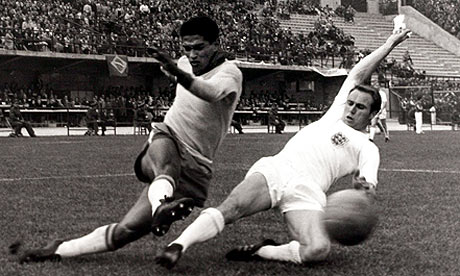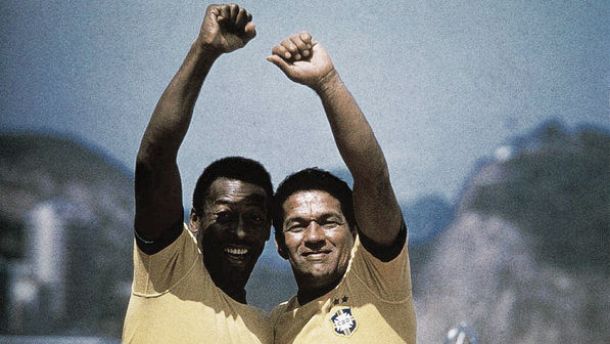Hosts Brazil went into the 2014 World Cup finals as favourites. Football’s most famous nation were awarded this accolade due to home advantage; a rousing Confederations Cup win over Spain and their much acclaimed samba style.
Five games in and the five time winners have not reached the dizzy heights set by the brilliant Brazil team that won the competition three times in just 12 years. Central to these performances was of course Pele, a name known around the world. Viagra adverts aside, many still consider the Santos star the greatest to have ever played the game.
The most sublime player of certainly his generation would be the first the natives looked for on the teamsheet, right? One man that has gone under the radar in Europe is Manuel Francisco dos Santos or “Garrincha” as he was more commonly known. The Brazilian public were incredibly fond of their silky forward and many even prefered him to superstar Pele, dubbing him as The Joy of the People.
"He had a childish spirit. Garrincha was football's answer to Charlie Chaplin.”
His more flamboyant style of play caught the eye in a time where tricks were a rarity. Stepovers and flicks became commonplace. He epitomised what we associate with Brazilian football, he paved the way for the Ronaldinho's and Neymar’s of today. It was not just the finesse he brought to the sport as to why football fans adored him so, but his personality. After making his international debut in 1958 the Botafogo man was unaware they had knocked the Russians out of the competition, he just wanted to play.
His innocence would be later confounded when he was often found kicking a ball about in his hometown when he should have been training with his club. It was this club, Botafogo, that gave him a chance at playing professionally. Due to his disabilities, which could have really prohibited him from any sport, being rejected from the big clubs became unfortunately normal. When he did get a trial at the Rio de Janeiro based side he was disillusioned, hardly able to muster up the strength to travel in fear of coaches laughing at him. His inward bent leg, deformed spine and shorter left leg meant he was not built for the game he loved. Despite his “bendy legs” Garrincha excelled and was immediately signed up for the club.
The already made husband and father was still earning his stripes when the 1954 competition came around, being kept out of the side by an impressive Julinho. The aging Fiorentina talisman was controversially told to stay in Italy for the upcoming competition as manager Vicente Feola opted for youth in the form of Vava, Pele and of course Garrincha. The famously strict Feola was unimpressed in a warm up game against Fiorentina where Garrincha waited for a defender, whom he had previously beaten, to challenge him again before scoring. It earmarked what a hugely talented and exuberant young man he was but it caused him to be dropped.
The head coach perhaps clashed with the way Garrincha went about his football and life. Before the World Cup had begun the squad were given a list of 40 things they were prohibited from doing and it’s hard to imagine Garrincha followed. His flare and care-costless attitude were asked to be introduced by some of the more experienced players in the team as Garrincha were brought on against the USSR.
Further comparisons between himself and friend Pele were made after a 1-0 victory over Wales in the quarter-finals, “Garrincha was more of a danger than Pelé I believe at the time, a phenomenon, capable of sheer magic” said defender Mel Hopkins in the aftermath.
The much acclaimed Edson Arantes do Nascimento (Pele) may have gotten on the scoresheet in the final against Sweden but his team-mate stole the show as he notched up a terrific assist. Showcasing in that game in particular why he was adored, he was able to stand up to his opponent when the ball was at his feet before singling out a target. His pace, ability to drop a shoulder and his final ball was unrivaled.
Two more finals followed whilst notching up his 232 league goals for Botafogo. Garrincha took the spotlight in 1962 and relished in it. After Pele had surcombed to a damning injury in just the second fixture of that summer, it was up to the others to propel the holders to stardom once more. Then 29-years-old, Garrincha left for home with the Jules Rimet trophy, the golden ball, three goals and a stray dog that managed to find it’s way onto the pitch in the game with England. He had truly announced himself as one of the great powers of world football, the English press branded him as “Stanley Matthews, Tom Finney and a snake charmer rolled into one”

His magnificent life started to deteriorate after a disappointing 1966 campaign. Struggling to control his demons, of which there were many, proved impossible in the end. His father was an alcoholic during a troubled childhood in Pau Grande and that ultimately became his fate too. Car crashes, affairs and beatings all occurred in the latter stages of his playing career. His reputation had not been tarnished though, after his death millions arrived at the Maracana to support their forgotten hero.










































